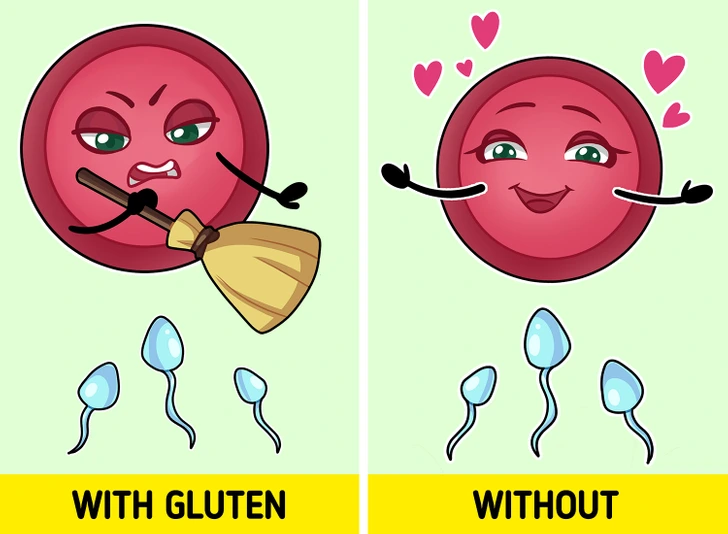Gluten, a protein found in grains like wheat, barley, and rye, can be a hidden trigger for numerous health issues. For many, the symptoms of gluten sensitivity or intolerance can go unnoticed or be mistaken for other conditions. Knowing the subtle signs that your body is struggling with gluten can help you take control of your health. Here are nine ways your body signals that gluten might be the culprit behind your discomfort.
1. Unexplained Weight Changes

Have you experienced sudden and unexplained weight loss or gain? Gluten intolerance can disrupt your body’s ability to absorb nutrients properly, leading to metabolic issues and inflammatory reactions. This imbalance can result in rapid weight fluctuations, even if your diet and exercise routine remain the same. If these weight changes are paired with other digestive symptoms, gluten could be playing a role.
2. Gastrointestinal Troubles: The Silent Distress
Digestive discomfort is often one of the first and most noticeable signs of gluten intolerance. Symptoms such as bloating, nausea, diarrhea, and abdominal pain often get misdiagnosed as irritable bowel syndrome (IBS). However, in many cases, the underlying issue is gluten. If you regularly experience gastrointestinal distress, it may be time to evaluate whether gluten is the root cause.
3. Skin Problems and Nail Issues
Your skin can reflect the state of your internal health, and gluten intolerance is no exception. Conditions like dermatitis herpetiformis, characterized by itchy blisters and rashes, are directly linked to gluten sensitivity. You might also notice brittle nails or recurring skin problems, such as eczema or hives. These are signals from your body, urging you to address the gluten in your diet.
4. Persistent Fatigue and Brain Fog
Feeling constantly drained or having trouble focusing? Gluten may be to blame. When your body struggles to process gluten, it can lead to chronic fatigue and brain fog. You might find it difficult to concentrate, feel irritable, or even experience frequent mood swings. These cognitive issues can stem from the inflammation and immune response triggered by gluten in your system.
5. Frequent Headaches and Migraines
Headaches and migraines can arise for many reasons, but if you find yourself experiencing them frequently, gluten could be the hidden factor. Studies have shown a link between gluten intolerance and an increase in migraines. If your headaches tend to occur 30 to 60 minutes after eating gluten-containing foods, it’s a strong sign that your body is reacting negatively.
6. Issues with Fertility and Hormonal Imbalances
For some women, unexplained fertility issues could be connected to gluten intolerance. Research has suggested that gluten can affect the reproductive system, leading to hormonal imbalances and even miscarriages. If you’ve been struggling with infertility or have a history of miscarriages, it might be worth investigating whether gluten is contributing to these challenges.
7. Oral Health Decline

Your teeth and gums might also show signs of gluten sensitivity. Gluten intolerance can interfere with the absorption of vital nutrients, including calcium, which is essential for strong teeth. You may experience increased tooth sensitivity, frequent cavities, or even mouth sores and ulcers. If dental issues persist despite good hygiene, gluten could be the hidden cause.
8. Iron Deficiency Anemia
Iron deficiency anemia is often one of the first conditions diagnosed in individuals with gluten intolerance or celiac disease. When your body is unable to absorb iron properly due to gluten-related intestinal damage, symptoms like fatigue, shortness of breath, pale skin, and headaches can occur. If you’ve been diagnosed with anemia and can’t pinpoint the cause, gluten may be the missing piece.
9. The Telltale “Gluten Face”

Ever notice puffy, red cheeks or dark spots around your chin? These facial symptoms, commonly referred to as “gluten face,” are a potential signal that your body is reacting to gluten. This flushing can be accompanied by inflammation or a drop in blood pressure after consuming gluten-rich foods, indicating an underlying sensitivity.
How to Address Gluten Sensitivity
If you suspect that gluten is causing your health issues, the first step is to consult your doctor for testing. A simple blood test can check for the antibodies associated with celiac disease or gluten sensitivity. It’s important to continue consuming gluten before the test to ensure accurate results.
Once diagnosed, the most effective treatment is to eliminate gluten from your diet. This means avoiding foods like wheat, rye, barley, and their derivatives. Pay close attention to food labels, and look for gluten-free alternatives to support your health.
Conclusion
Gluten intolerance can manifest in various subtle and not-so-subtle ways, affecting everything from your digestive system to your skin, energy levels, and even fertility. Recognizing these signs and taking action can lead to significant improvements in your well-being. By eliminating gluten from your diet and listening to your body’s signals, you can regain control of your health and feel your best.
By being aware of these nine signals, you can take proactive steps to protect your health and improve your quality of life. Don’t ignore the signs—your body might be telling you that it’s time to go gluten-free!


